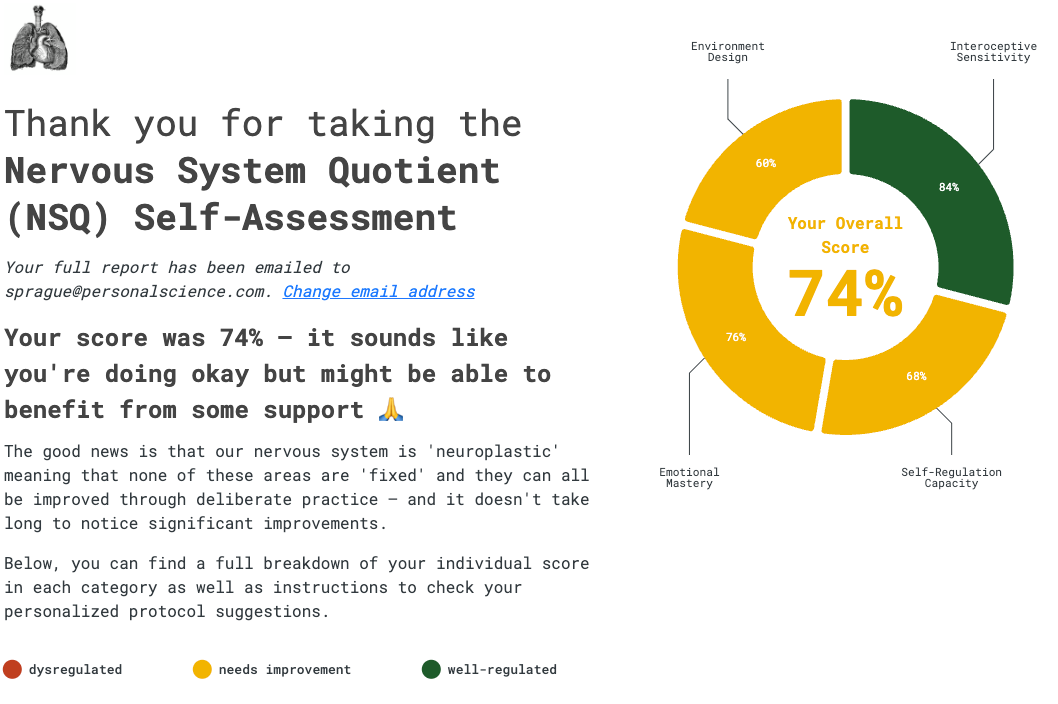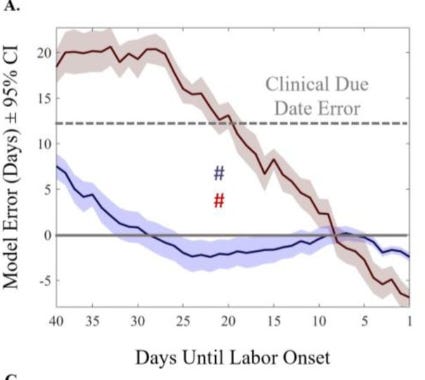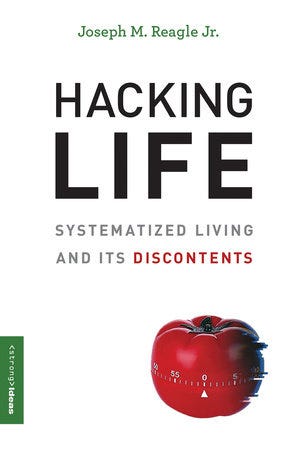We’ve previously described the intriguing theories that emotions aren’t real and a review of a recent book that argues the much of our “brain” is actually in the “periphery”, an extensive system of nerves extending throughout the body and the gut.
Since personal scientists are always on the lookout for simple ways to quantify these effects, we were happy to find a new Nervous System Quotient Test.
Nervous System Quotient (NSQ)
Jonny Miller (@jonnym1ller) is a motivation consultant who thinks of the nervous system as a bodily organ that can be trained and reshaped just like other muscles. He offers a simple on-line quiz to assess roughly what kind of nervous system you have now.
The questions are simple, but require a certain amount of self-awareness:
“I am able to notice where tension is located inside my body”
“I notice if my breath shifts or if I hold my breath while working”
Click here to take the 5-minute quiz: https://assessment.nsmastery.com/questions
Here are my results:
NSQ recommends several ways that I can improve my score, including a series of breathing introspective exercises called NDSR (Non-Sleep Deep Rest). The basic idea reminds me of the kind of hypnosis we mentioned in PS Week 220519. We discussed the “eye roll” test of your level of hypnotizability, which seems like something you can train with NDSR.
More details are in a 2018 paper that compares it to a type of Yoga called Yoga Nidra designed to put you briefly into a state of “waking sleep”. Supposedly this will increase your ‘interoceptive’ sensitivity — or capacity to sense, track and feel our internal state.
You can watch Jonny Miller’s 14-minute Guided NSDR Practice video for examples. The science behind this and a collection of other sleep-related ideas are in Andrew Huberman’s Sleep Toolkit.
How well-rested do you feel
Meanwhile, if you are concerned about poor sleep, check these results computed from the American Time Use Survey as plotted by Flowing Data. On average, people tend to sleep better the older they get, until things taper off after age 70.
Want to know more about how your sleep habits compare? US News & World Report compiled a list of dozens of survey results including: 70% of pet owners sleep with their pets, 15% listen to white noise, 10% to audiobooks, and (only!) 40% wash their sheets weekly.
Personal Scientist of the Week
Quantified Self friend and scientist Azure Grant, in her new academic publication Deep Learning Model Using Continuous Skin Temperature Data Predicts Labor Onset follows 100 women who wore an Oura Ring during pregnancy.
The dark horizontal line at zero is the actual date of delivery. The blue line is how close the Oura Ring-based model was able to predict “spontaneous” labor, which you can see is much more accurate than the dotted line for “clinical due date”, computed the traditional way. The red line is for deliveries that are induced, and therefore don’t follow the normal biological pattern.
We mentioned Azure Grant and her Quantified Labs study about cholesterol in PS Week 240125.
Bottom line: get an Oura Ring for the pregnant women in your life. It appears to predict the due date better than other methods.
Links worth your time
U-Penn Wharton Professor Ethan Mollick notes that prestigious journals are now sufficiently gated that publishing in them actively interferes with scientific work. “Publishing in an expensive journal can lower, rather than raise, citation counts.”
AI expert turned biologist Daphne Koller says “math is to physics as machine learning is to biology”. In a podcast Interview with Eric Topol, she proposes that new drug breakthroughs come in three buckets (1) hypotheses generation, (2) development of a molecule, and (3) testing it clinically. Why can’t personal scientists help with (1) to generate more hypotheses, based on our everyday experience?
Personal scientist and U-Penn immunologist Dr. David Fajgenbaum has been awarded a $48 Million Grant for his non-profit, Every Cure, to build an AI platform that will scale the approach he used to treat his own rare disease.
Dan Williams breaks down the industry devoted to preventing “misinformation”, with detailed examples of how the misinformation “experts” are themselves often wrong and why free flow of information is the best way to counter-act false information.
MIT Press publishes a number of high-quality books that are free to download, including a survey of personal science called Hacking Life by Joseph Reagle. One of the chapters includes quotes from Yours Truly.
About Personal Science
Personal Science Week is delivered each Thursday. Paid subscribers get access to our Unpopular Science series, featuring science-based facts and ideas that “experts” don’t want widely disseminated, such as our most recent post about marriage, who was wrong about COVID, and vaccines.
If you have ideas or other topics you think will benefit other Personal Scientists, please let us know.






